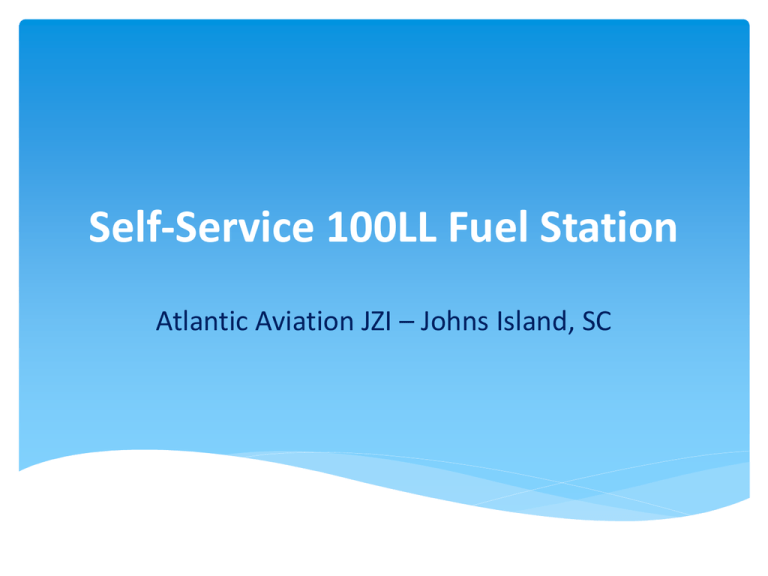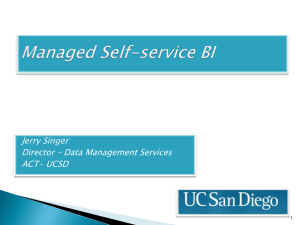Installation and Advantages of Self
advertisement

Self-Service 100LL Fuel Station Atlantic Aviation JZI – Johns Island, SC JZI Self-Service 100LL Background Atlantic JZI began offering self-service 100LL in May 2012. Prior to this, demand for lower priced 100LL was high among the many based and transient piston operators at JZI. Many of these operators would fly out of their way to smaller airfields in order to save money of fuel. Self-service was the only way that Atlantic JZI could offer 100LL at prices comparable to these smaller operations. After considering potential positive and negative effects we determined that the pros of self-serve outweighed the cons. Initial Concerns of Self-Service 100LL Margin cannibalization – If enough customers opted for self-serve over fullserve the lower margin would negate any increase in volume sold. We felt we could overcome this because our target customers were not buying any fuel and we expected that many customers would still prefer full-serve. Invoicing – Since the self-service station would be invoiced by a 3rd party we had concerns that some customers may use the self-serve to avoid facility fees. We knew that there were already some customers who were trying to avoid fees, so with self-serve we would at least be getting revenue from fuel sales. Investment – Because the self-serve margins are low, we had concerns on ROI. The total initial investment in the station is less than a new refueling truck and with the station we would extend the life of our current refueling truck while at the same time being able to attract new customers and higher uplifts. Justifications for Self-Service at JZI 50 based piston aircraft at JZI, majority not buying fuel. No other self-service 100LL options in Charleston County. Located on the coast as a fuel stop for flights along the east coast. Proximity to popular destinations ensures steady transient traffic. Unlike FBO, station open 24/7 Initial investment on station is less than that of a new 100LL refueler. JZI Self-Service 100LL Timeline * May 2011 – Research began, U-Fuel selected as vendor * November 2011 – Internal approval granted by Atlantic * January 2012 – Approval granted by Airport Authority * April 2012 – Permit obtained by City, Site prep completed * May 1, 2012 – Self-service 100LL station online at JZI Expectations for Self-Service at JZI Capture fuel sales from cost conscious piston operators, including based aircraft and transient customers. Improve relationship with local aviation community. Use labor more effectively on full-service customers, increasing both customer service and safety. Increase total gallons of 100LL sold at JZI through increased visits and uplifts at a lower margin. Maintain a positive relationship with Aviation Authority. U-Fuel 100LL Box Station We chose the 3,450 gallon Box Station by U-Fuel for our 100LL Self-Serve Station. Station comes prefabricated with fuel tank, pump, card reader, etc. already installed. Safety features exceed requirements by all federal, state and local regulations. Minimal site prep needed in preparation of delivery and easy installation upon delivery. Self-Service Station - Permitting Permits must be obtained before installation begins. JZI is located within the city of Charleston, so all applicable permits were obtained through the city. Fire Marshal approval – system comes standard with many fire safety features which help this process. Ensure compliance with DHEC, flood zones, wind suppression, fire hydrant proximity, local ordinances. Construction permits needed to lay concrete for pad and to install power and phone lines to the station. Self-Service Station - Site Prep Concrete pad to place fuel station on w/ bollards. Electrical and phone lines to the station, emergency fuel shutoff system. Fuel station can be placed directly on ramp, but pad increases safety. Self-Service Station - Installation Heavy forklift to pull station out of truck (not needed if station is on flatbed). Crane to pick up station and position it on concrete pad. Anchor station to concrete. Install piping, calibrate fuel pump and card reader. Self-Service Station - Maintenance Quality Control – integrate self-serve station into existing QC program. Sump tank & filter daily Annual filter change Occasional maintenance – repair bonding reel, fix any leaks in piping, fix jam in receipt printer as needed. Self-Service - Customer Response Customer response has been overwhelmingly positive. Based customers who never purchased fuel at JZI before were pleased and began to purchase from self-serve. On AirNav.com and similar sites customers who historically complained of high prices at JZI left positive comments. Transient customers were pleased to have the option on the field, although many still preferred full-serve. Overall, there were very few complaints on the self-serve station, mostly technical issues which we worked out. JZI Self-Service - Operations The self-service station has been a success so far after almost 2 years. As predicted, most transient customers still prefer full-serve to self-serve. Many base customers who never fueled at JZI now use the self-serve. Many customers who purchased small amounts of full-serve in the past now top-off with self-serve fuel, increasing our 100LL uplifts. JZI 100LL Gallons Sold 2011-2013 90000 80000 70000 60000 50000 40000 30000 20000 10000 0 Full-Serve Self-Serve Total 100LL 2011 2012 2013 Self-serve 100LL first available 5/1/12 Self-serve is averaging 3,000 gal. sold/month. Total gallons sold have increased each year While declining, fullserve fuel sales remain the majority for 100LL Self-Service 100LL - Summary Self-Service 100LL can be a great addition to GA airports like JZI. Once installed, system requires minimal maintenance. Many operators see price as the #1 factor on where to buy fuel. Lower prices will increase uplifts and attract new customers. Improves relationships with customers and airport owners.





